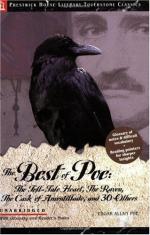|
This section contains 1,072 words (approx. 4 pages at 300 words per page) |

|
SOURCE: "The Dream in 'The Tell-Tale Heart'," in English Language Notes, Vol. 7, No. 3, March, 1970, pp. 194-97.
In the following essay, Canario argues that the narrator of "The Tell-Tale Heart" is the "deranged victim of a hallucinatory nightmare" about death.
Hervey Allen observed in a footnote to Israfel that the logic of Poe's stones is "The mad rationalization of a dream."1 This observation is especially applicable to "The Tell-Tale Heart," which becomes fully understandable only when the narrator is recognized as the deranged victim of an hallucinatory nightmare.
Most commentators on the story have praised it either for its powerful evocation of terror or its artistically skillful revelation by degrees of the narrator as a homicidal maniac. Arthur Hobson Quinn's description of the story as "A study of terror" and "A companion piece to 'The Pit and the Pendulum'" exemplifies the first view.2 E. Arthur Robinson's close analysis of...
|
This section contains 1,072 words (approx. 4 pages at 300 words per page) |

|


